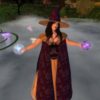Let’s go into the written word, specifically things like the runes and talismans. They were written concepts, though in the case of some talismans, the concept was extremely abstract like a depiction of a star constellation for the system of meridians in the human body.
We engage in what are called neologisms even today. The creation of new words. But wizards both worked with the most primal languages and sought out new words and songs in that deep realm of consciousness that many are out of touch with today. So when they spoke the word ‘cat’ say, it carried a greater degree of meaning and association in both their perception and their emotion. Because it carried so much meaning and triggered so much emotion, they could use their words to trigger responses in their own mind that would affect other people, other things, animals and plants, chemicals. Well, perhaps there was no limit, maybe like a reflexively triggered psychokinesis? They were reported to be able to do things like command a rock to move, and actually have it move. Perhaps we don’t have to speak to do that, but why not speak if it works? What do you think friends?
They say Tibetan Buddhist masters can still do things like that. And because of their focus on the lands they lived in, their perception of the big picture of the world around them, they could focus that energy on influencing even complex chains of cause and effect.
Now each culture of wizards did have its own style of focus. Middle eastern wizards are more elementally focused. African wizards were more focused on elements of the biosphere.
A person’s name can have a powerful effect on you both positive and negative depending on the relationship.
Let’s run with that to give an example of applied wizardry. The mind doesn’t distinguish between words and the things we associate with those words. If I say cat, you will begin experiencing, if only to a mild degree, all your recollections and feelings of cats as well as associated statements and opinions you have heard other people voice about cats. On a human level, we tend to associate ideas with people’s names, even ascribing personality types to specific names. Like when I say the name Bob, you likely think of a crass and perhaps dull witted stereotypical male, yes?
Yes. If a name doesn’t fit someone they usually end up with a nickname or go by their initials. Also true.
Maybe like a 50s stereotype. Yes. Those images permeate our mind very deeply, but so do all the ideas we associate with the word and thus the colour red, and all the ideas we associate with golf clubs or specific styles of car. The wizard uses all these meanings to create the perception of a reality they want you to function with. They wear black if they want you to hesitate. White, if they want to seem above suspicion. They wear jewellery of various types based on what the symbols mean. They give variations of their name, or even a different name, if that fits their intention better.
Politician spin-meisters will change the name of something to change the public’s perception of it. Exactly. “Job creation” instead of “environmentally hazardous.” Yes, amusing how they do that. “Rehabilitation facilities” instead of “concentration camps.” “Drug therapy” instead of “narcotic stupor.”
Wizards apply spin to the whole world, but not as superficially as politicians because they don’t confine their messages to people. Animals respond to communications also, and it can be argued everything does. A wizard could have an interaction with a neighbourhood dog and leave that dog to focus unwanted attention on someone the wizard didn’t like.
In the interaction with the dog, that would take something more beyond words. Oh, it does. The words are more for the wizard’s sake than the worlds.
Your thoughts are welcome. Be well friends.
Travis Saunders
Dragon Intuitive
~science,mysticism,spirituality~



Leave a Reply